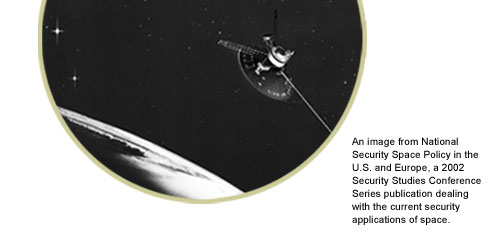
 
If you undertook to study war and peace at MIT, you might end up in a Russian literature class. Or, you might find yourself engaged in the work of the Security Studies Program.
As issues of war and security have moved to the forefront of the national consciousness, the Political Science department's Security Studies Program (SSP) has received increasing attention for its efforts to understand and interpret world conflicts.
A policy research and teaching component of the MIT Center for International Studies, SSP was founded in the 1970s as the "MIT Defense and Arms Control Program." The program brought together
two distinct intellectual traditions: Professor William Kaufmann's classes on international security topics and defense budgeting in the 1960s, and MIT-wide seminars on nuclear weapons and arms-control
policies begun by Professors Jack Ruina and George Rathjens in the 1970s.
Like almost all MIT programs, SSP reflects and responds to major outside-world trends. Thus, the first iteration of the program was geared mainly towards Cold War issues. As the "superpowers" conception of the world gradually receded in the 1980s, the program adjusted accordingly. Professor Harvey Sapolsky—a 35-year MIT faculty veteran who was asked to head the program in the early
1990s—recalls the challenge of that day: "There was some thought that the program might go out of business, because the Cold War had been such a major focus. Some of the foundations that had provided a lot of support were leaving the field. But the world has its own way of keeping a certain amount of turmoil going, and the program gradually evolved to meet these new realities. We've broadened the base, and become more comprehensive."
In the 1990s, for example, the program evolved to focus on many of the regional conflicts that sprang up in the post-Cold War world. Through the U.N. and other organizations, SSP students learned the new realities of Kosovo, Serbia, Bosnia, and other trouble spots. SSP experienced another inflection point in the aftermath of the terrorist attacks of September 11th, 2001. Student interest in terrorism, as well as the intertwined issues of religion and war, has surged, and the program has grown and changed rapidly to accommodate this interest. Most recently, the U.S.-led wars in Afghanistan and Iraq have increased the visibility of program faculty and alumni.
Today, SSP enjoys a reputation as one of the nation's top academic resources in the realms of international security, grand war strategy, arms-control issues, and war technology. It continues to be the first choice for most PhD students interested in studying issues of peacekeeping, U.S. intervention, U.S. foreign policy, conventional forces, and terrorism. It draws students from all around the globe, and also attracts fellows from all branches of the armed services.
SSP's principal objective is the education of the next generation of international security scholars and practitioners. "Our students are always the first priority," comments Sapolsky. "They also help the program keep its broad range of expertise. Because we're educating graduate students, who will be influencing policy for the next generation, we can't be driven purely by current events. That gives us a deep perspective, and demands a focus on the historical and theoretical as well as the contemporary."
The program currently has almost 50 graduate students, nearly all of whom are doctoral candidates in political science. In addition, more than twenty fellows are attached to the program, including four
members from each of the armed services—who receive War College credit for their work at MIT—scientists and engineers from the U.S. and abroad, and several former government officials.
In addition to their teaching duties, faculty members (and program alumni) receive frequent requests to advise the government on strategy. Though the program tries to keep contract work to a minimum, SSP did fulfill two specific requests for assistance from the government this year. In the spring, at the request of U.S. Central Command, SSP convened a working group of graduate students—led by Professors Richard Samuels, director of the Center for International Studies, and Professor Steven Van Evera—to explore potential issues in the post-conflict redevelopment of Iraq. And in January 2003, SSP hosted the first unclassified meeting on the strategic implications of cyberwarfare attacks, bringing together the nation's leading experts in the field.
Program faculty members and alumni are also asked regularly by media outlets to help interpret the latest developments in world conflicts. From Professor Theodore Postol of the Program in Science, Technology and Society on missile defense to Dr. Owen Cote, a Principal Research Scientist in SSP on the conflict in Iraq—and from alumnus Jim Walsh on weapons of mass destruction to alumnus Kenneth Pollack's views on the war in Iraq—SSP is helping to shape and guide public discussion on crucial security issues in today's world. As Professor Steven Van Evera points out, this is a critical part of SSP's job, and SSP professors take it seriously.
"In general," he says, "I believe there's a dismaying disregard today in academia for being part of the public discourse. That's really reprehensible. Universities should reward their faculty members for participating in the discussion. And thankfully, participation is the general ethos of the Political Science department here at MIT."
top
back
|
|
